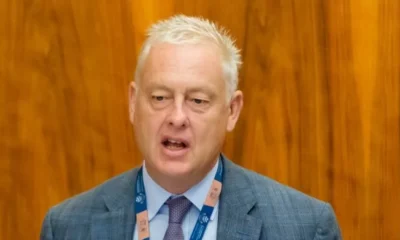Barely two months after the September completion deadline flop, the Nigerian National Petroleum Commission (NNPC) has explained why it could not deliver the much-awaited Port Harcourt Refinery Company.
In an interview (with The Punch) on Monday, the NNPC Chief Corporate Communications Officer, Olufemi Soneye, said the company encountered risks and challenges while carrying out the rehabilitation, being a brownfield project.
He noted that the NNPC began the commissioning of critical equipment and processing units after the mechanical completion in Nigeria.
“You may recall that mechanical completion of the PHRC revamp was successfully achieved several months ago, marking a significant milestone in the project. Following this, we began the commissioning of critical equipment and process units.”
“However, as is common with brownfield projects of this scale and complexity, we encountered unforeseen risks and challenges,” he stated.
Nonetheless, he told (The Punch) that the issues were resolved and commissioning activities have resumed.
Soneye stressed that work is being carried out to ensure the project’s completion.
“These issues have since been effectively resolved, and commissioning activities have resumed.”
“Work is being carried out around the clock to ensure the successful completion of this critical project,” he told our correspondent.
Asked if there is any timeline for the completion of the project, he replied, “Shortly.”
It was observed that the NNPC desisted from giving new deadlines for the delivery of the refinery, having failed to meet its deadlines seven times.
The moribund Port Harcourt refinery is one of three owned by the Federal Government and managed by the NNPC.
Nigerians have been hopeful that the cost of fuel could crash if the country refines its crude and ends the import of refined products.
The NNPC said last week that it would continue to import fuel, saying it was not the sole off-taker of petrol at the Dangote refinery.
The refinery, situated in Nigeria’s oil-rich Niger Delta region, has been in operation since 1965, but later became moribund for several years.
In March 2021, the Nigerian government acquired a $1.5bn loan for the renovation and modernisation of the refinery, but the contractor handling the project has yet to announce its completion.
It was gathered that promises made to Nigerians by the Federal Ministry of Petroleum Resources and the NNPC about the refinery have continued to hit brick walls.
After the failure of the sixth deadline in early August, the then Chief Financial Officer of the NNPC, Umar Ajiya, said the refinery would commence operations in September 2024.
However, September ended without a word from the NNPC about the refinery, and Nigerians have been left in the dark since almost two months ago.
Recall that the contractor overseeing the rehabilitation of the Port Harcourt refinery, Maire Tecnimont SPA, refused to disclose the completion date for the project, despite a formal request from a human rights lawyer, Femi Falana.
Apparently baffled by the delay in the completion of the project, Falana had filed an official request under the Freedom of Information Act, seeking clarity on the date set aside for the project completion.
In response, Maire Tecnimont’s legal representative, Muyiwa Ogungbenro, a partner at Olajide Oyewole LLP, sent a letter to Falana in early October, declining to reveal the information.
Ogungbenro stated that the Managing Director of Maire Tecnimont SPA, as part of an independent private contractor, is not obligated to disclose such information under the FOI Act.
“We are counsel to Maire Tecnimont SpA, and we have our client’s instruction to respond to your letters dated 17 and 24 September 2024 requesting information on the contract between our client and Nigerian National Petroleum Company Ltd.
“Our client is a private company. Being a private independent contractor, our client is not a company in which any government has a controlling interest, and does not provide public services, functions or utilise public funds for them to be bound by the obligations in the Freedom of Information Act.
“On this ground, our client regrettably cannot provide the information you have requested,” Ogungbenro declared.
Since then, information about the refinery has been kept from the public, whose hope for cheaper petrol lies in the facility.
From December 2023, NNPC had been giving Nigerians different dates, assuring them that the refinery would begin the sale of refined products soon, having attained mechanical completion.
In July, the Group Chief Executive Officer of the NNPC, Mele Kyari, stated categorically that the refinery would come into operation in early August. He had said in 2019 that the NNPC would deliver all the country’s four refineries before the end of former President Muhammadu Buhari’s administration last year.
When he appeared before the Senate in July, Kyari boasted, “I can confirm to you, Mr Chairman, that by the end of the year, this country will be a net exporter of petroleum products.
“Specific to NNPC refineries, we have spoken to a number of your committees, and it is impossible to have the Kaduna refinery come into operation before December, it will get to December, both Warri and Kaduna; but that of Port Harcourt will commence production early August this year.”
However, the promise was not fulfilled in August which was the sixth postponement.
Though the NNPC said it was on course, the refinery has yet to commence operations even as the fourth quarter of the year nears the end.
Recall that the 210,000 barrels per day refinery was said to have reached what the NNPC called mechanical completion of rehabilitation work in December. It stated that the facility would start refining 60,000 barrels of crude oil daily after last year’s Christmas break.
Later in January, Kyari said the refinery was being tested and would be ready by the end of the first month.
During the second month of the year, the Shell Petroleum Development Company of Nigeria Limited completed the supply of 475,000 barrels of crude oil to the facility, raising the expectations of marketers that production would soon start.
This came a few weeks after the NNPC said in January that it was seeking to engage reputable and credible operations and maintenance companies to run the refinery.
In mid-March, Kyari said the Port Harcourt refinery would commence operations in two weeks, April.
“We are serving this country with honour and dignity. And we will make sure that the promises we make on the rehabilitation of these refineries will take place,” Kyari stated after he appeared before the Senate Ad-hoc Committee investigating the various turnaround maintenance projects of the country’s refineries.
As the April deadline elapsed, independent petroleum marketers told (The Punch) that the facility would begin production by the end of July.
Commenting on this then, NNPC’s spokesman, Soneye, said that regulatory approvals from international bodies were the only impediment stalling the operational commencement of the refinery.
Credit: The Punch

 BIG STORY5 days ago
BIG STORY5 days ago
 BIG STORY4 days ago
BIG STORY4 days ago
 BIG STORY4 days ago
BIG STORY4 days ago
 BIG STORY4 days ago
BIG STORY4 days ago
 BIG STORY4 days ago
BIG STORY4 days ago
 BIG STORY1 day ago
BIG STORY1 day ago
 BIG STORY4 days ago
BIG STORY4 days ago
 BIG STORY12 hours ago
BIG STORY12 hours ago
























